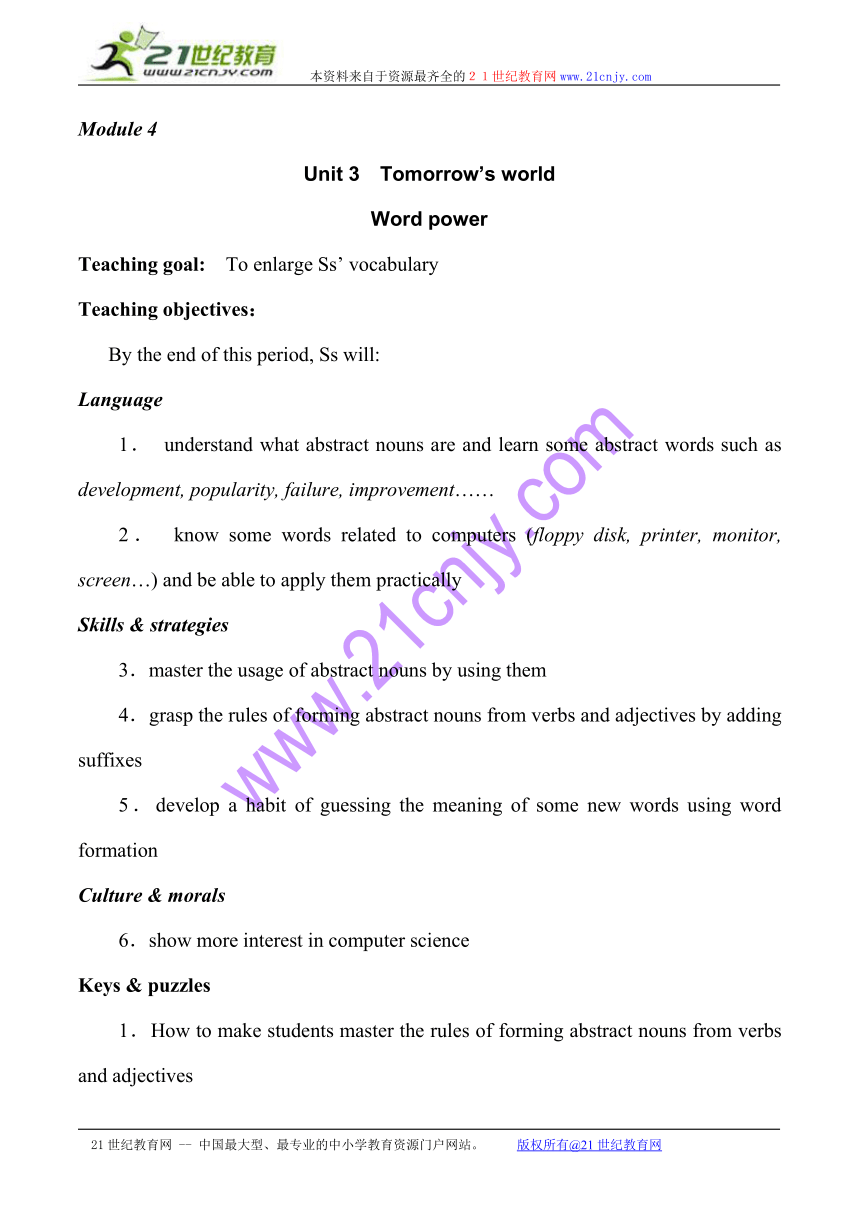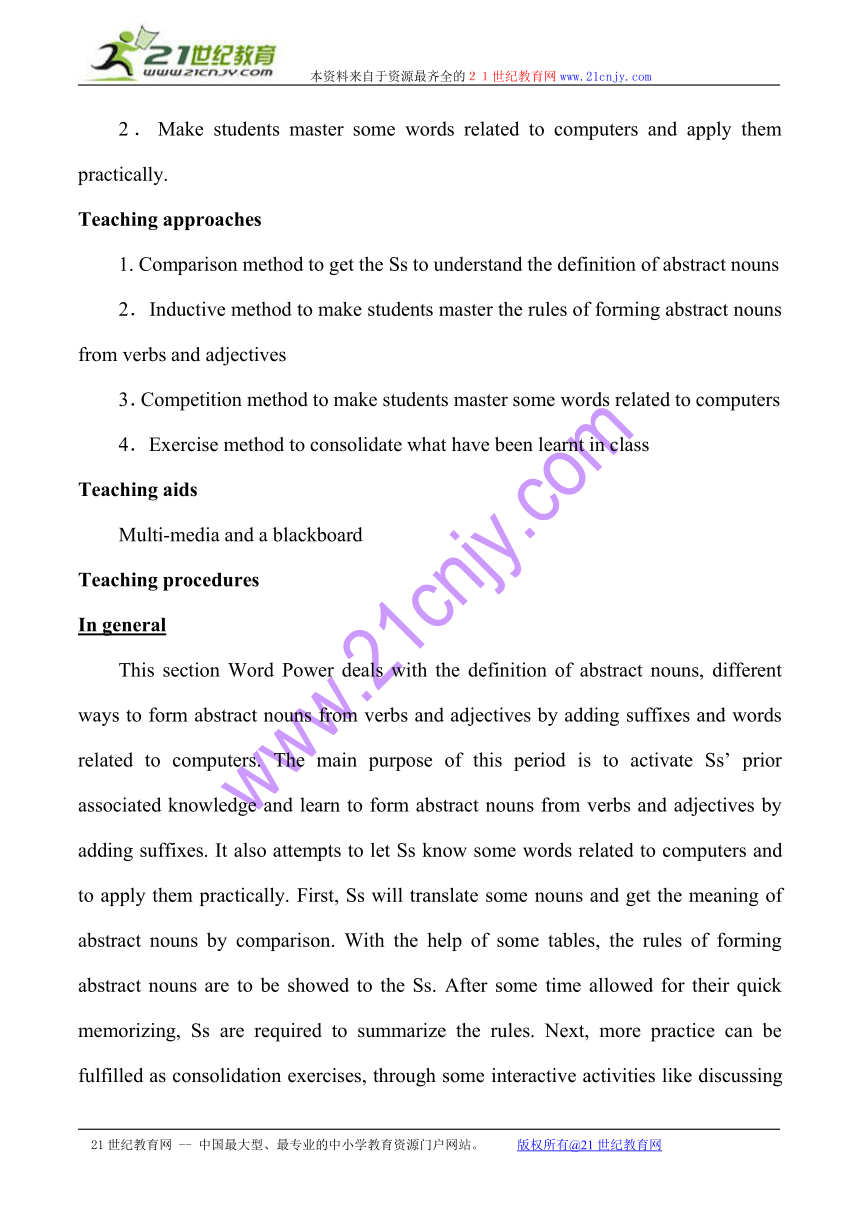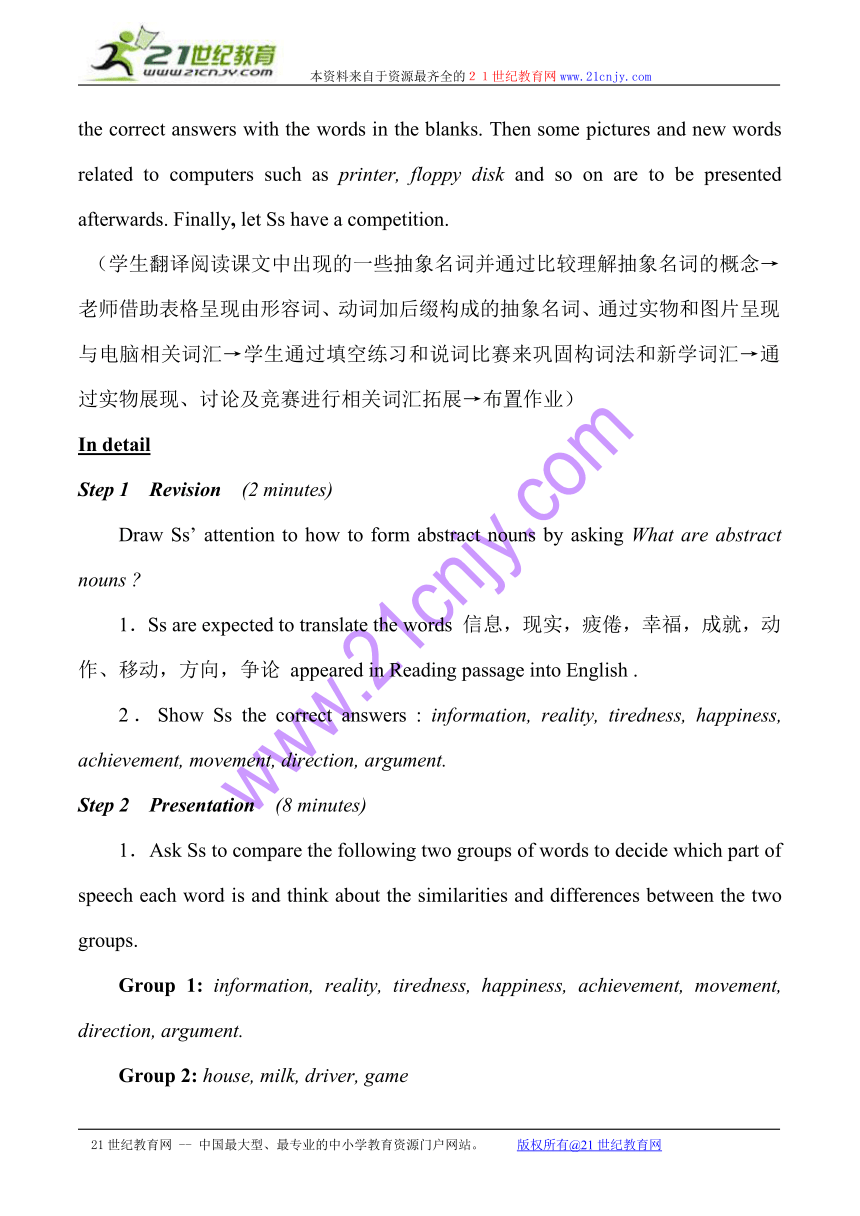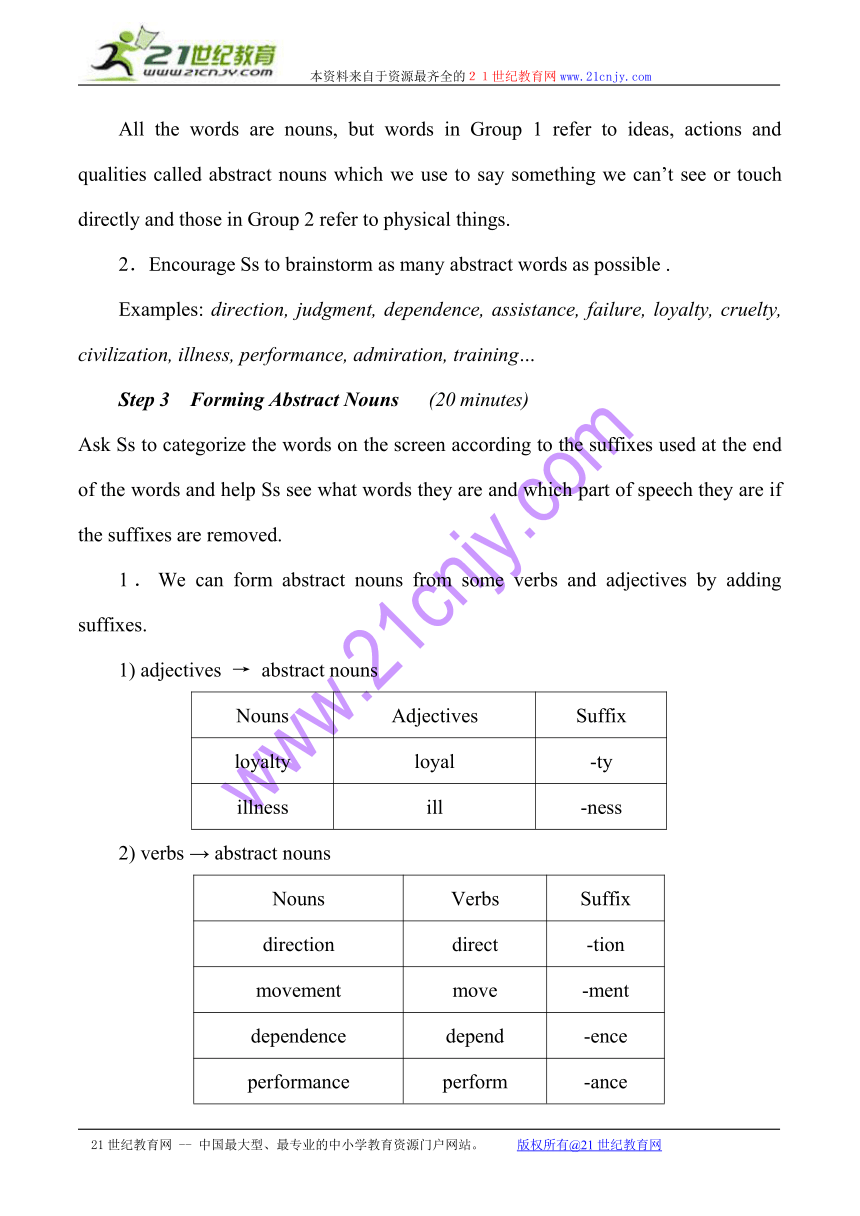Module 4 Unit 3 Tomorrow’s world
文档属性
| 名称 | Module 4 Unit 3 Tomorrow’s world |

|
|
| 格式 | rar | ||
| 文件大小 | 503.0KB | ||
| 资源类型 | 教案 | ||
| 版本资源 | 牛津译林版 | ||
| 科目 | 英语 | ||
| 更新时间 | 2010-08-02 16:41:00 | ||
图片预览




文档简介
本资料来自于资源最齐全的21世纪教育网www.21cnjy.com
Module 4
Unit 3 Tomorrow’s world
Word power
Teaching goal: To enlarge Ss’ vocabulary
Teaching objectives:
By the end of this period, Ss will:
Language
1. understand what abstract nouns are and learn some abstract words such as development, popularity, failure, improvement……
2. know some words related to computers (floppy disk, printer, monitor, screen…) and be able to apply them practically
Skills & strategies
3.master the usage of abstract nouns by using them
4.grasp the rules of forming abstract nouns from verbs and adjectives by adding suffixes
5.develop a habit of guessing the meaning of some new words using word formation
Culture & morals
6.show more interest in computer science
Keys & puzzles
1.How to make students master the rules of forming abstract nouns from verbs and adjectives
2.Make students master some words related to computers and apply them practically.
Teaching approaches
1. Comparison method to get the Ss to understand the definition of abstract nouns
2.Inductive method to make students master the rules of forming abstract nouns from verbs and adjectives
3.Competition method to make students master some words related to computers
4.Exercise method to consolidate what have been learnt in class
Teaching aids
Multi-media and a blackboard
Teaching procedures
In general
This section Word Power deals with the definition of abstract nouns, different ways to form abstract nouns from verbs and adjectives by adding suffixes and words related to computers. The main purpose of this period is to activate Ss’ prior associated knowledge and learn to form abstract nouns from verbs and adjectives by adding suffixes. It also attempts to let Ss know some words related to computers and to apply them practically. First, Ss will translate some nouns and get the meaning of abstract nouns by comparison. With the help of some tables, the rules of forming abstract nouns are to be showed to the Ss. After some time allowed for their quick memorizing, Ss are required to summarize the rules. Next, more practice can be fulfilled as consolidation exercises, through some interactive activities like discussing the correct answers with the words in the blanks. Then some pictures and new words related to computers such as printer, floppy disk and so on are to be presented afterwards. Finally, let Ss have a competition.
(学生翻译阅读课文中出现的一些抽象名词并通过比较理解抽象名词的概念→老师借助表格呈现由形容词、动词加后缀构成的抽象名词、通过实物和图片呈现与电脑相关词汇→学生通过填空练习和说词比赛来巩固构词法和新学词汇→通过实物展现、讨论及竞赛进行相关词汇拓展→布置作业)
In detail
Step 1 Revision (2 minutes)
Draw Ss’ attention to how to form abstract nouns by asking What are abstract nouns
1.Ss are expected to translate the words 信息,现实,疲倦,幸福,成就,动作、移动,方向,争论 appeared in Reading passage into English .
2.Show Ss the correct answers : information, reality, tiredness, happiness, achievement, movement, direction, argument.
Step 2 Presentation (8 minutes)
1.Ask Ss to compare the following two groups of words to decide which part of speech each word is and think about the similarities and differences between the two groups.
Group 1: information, reality, tiredness, happiness, achievement, movement, direction, argument.
Group 2: house, milk, driver, game
All the words are nouns, but words in Group 1 refer to ideas, actions and qualities called abstract nouns which we use to say something we can’t see or touch directly and those in Group 2 refer to physical things.
2.Encourage Ss to brainstorm as many abstract words as possible .
Examples: direction, judgment, dependence, assistance, failure, loyalty, cruelty, civilization, illness, performance, admiration, training…
Step 3 Forming Abstract Nouns (20 minutes)
Ask Ss to categorize the words on the screen according to the suffixes used at the end of the words and help Ss see what words they are and which part of speech they are if the suffixes are removed.
1.We can form abstract nouns from some verbs and adjectives by adding suffixes.
1) adjectives → abstract nouns
Nouns Adjectives Suffix
loyalty loyal -ty
illness ill -ness
2) verbs → abstract nouns
Nouns Verbs Suffix
direction direct -tion
movement move -ment
dependence depend -ence
performance perform -ance
failure fail -ure
training train -ing
2.Tips:
1)
2) Most abstract nouns are uncountable, only a few of them are countable:
hope→ a hope; idea→ a idea; situation→ a situation
youth(青春)→a youth(青年人); power(电力)→a power(大国);
beauty(美丽)→a beauty(美人,美的东西)
3.Consolidation exercises :
I.Fill in the blanks with suitable abstract nouns according to the words given.
1) The government (govern) is trying to take some safety (safe) measures to ensure the growth (grow) of teenagers.
2) His final appearance (appear) was really a great pleasure (please) to us.
3) Jack’s happiness ( happy) was the result of many years of hardship(hard). His struggle did leave a deep impression (impress) on his friends.
4) The cruel mother showed no acceptable (accept) to the poor girl, who suffered a lot from the refusal (refuse).
5) Once a decision (decide) is made, you should carry it out with confidence (confident). Then there’ll be some possibility (possible) of your success.
6) Since his childhood (child), the boy knew that honesty (honest) was of great importance (important), which would lead to his great achievement (achieve) .
7) In this kingdom (king), leadership (leader) should be achieved through the fierce movement (move).
8) On the man’s arrival (arrive) in Liverpool, he began his amazing way to his stardom (star).
9) According to his explanation (explain), he seems to be innocent.
10) Wei Fang was doing basketball training (train) when she heard a terrible cry from the distance
II.Enjoy a passage:
Jeff Bezos has played an important role in the development of Amazon.com, an online shop selling mainly books and music. He decided to set up Amazon.com when he saw the growing popularity of the Internet.
During the first few years, the company did not make a profit and Mr. Bezos thought that his efforts would end in failure. However, Internet connection became faster and a lot of improvements were made to home computers.
Step 4 Vocabulary extension – Words related to computers (10 minutes)
Help Ss identify words about computers and understand the functions of different parts of a computer.
1. Show some pictures and revise names of some parts of the computer.
(screen, monitor, speaker, keyboard, mouse, CD-Rom, printer)
2.Teach Ss to learn more words related to computers, especially the most up-to-date hardware: (hard drive, floppy disk, floppy disk drive, U-Disk, ROM, RAM, CPU)
3.Help Ss to discuss the functions of different parts of a computer.
Part function
floppy disk a flat piece of plastic for storing information
keyboard a set of keys for typing
printer a machine that puts the words and pictures onto paper
screen a part where you can see the words and pictures
monitor a screen that shows information from a computer
e.g: S1: What’s the function of the printer
S2: We can use it to put the words and pictures onto paper. Which part of the computer is used for typing
S1: ……
4.More words related to computers
scanner 扫描器 sound card声卡
Hyperlink 超链接 network card
cursor 光标 click点击
Step 5 Competition (5 minutes)
Speak out as many words related to computer science as possible in Groups of four and see which group is the best one.
Step 6 Homework
1. Revise what we have learnt in this part.
2. Try to find more information about computer science.
3. Preview Grammar and usage.
Feedback
Mine
As this period deals with many new abstract words formed by adding suffixes or related to computer science and most of the words are not included in the wordlist, Ss are expected to learn and digest them in class. In this case, practicing memorizing and using them should be the key task of this period. In fact, it was. The practice doing in this period proved to be beneficial to Ss’ digestion. And, of course, for some students, abstract words are too difficult to understand. They are accustomed to seeing objects while memorizing some words. So pictures and objects are helpful for them. Also interactive activities like competition surely can arouse their interest in learning. If we want all the Ss to meet the objectives, it calls for patience and persistence.
Yours
21世纪教育网 -- 中国最大型、最专业的中小学教育资源门户网站。 版权所有@21世纪教育网
Module 4
Unit 3 Tomorrow’s world
Word power
Teaching goal: To enlarge Ss’ vocabulary
Teaching objectives:
By the end of this period, Ss will:
Language
1. understand what abstract nouns are and learn some abstract words such as development, popularity, failure, improvement……
2. know some words related to computers (floppy disk, printer, monitor, screen…) and be able to apply them practically
Skills & strategies
3.master the usage of abstract nouns by using them
4.grasp the rules of forming abstract nouns from verbs and adjectives by adding suffixes
5.develop a habit of guessing the meaning of some new words using word formation
Culture & morals
6.show more interest in computer science
Keys & puzzles
1.How to make students master the rules of forming abstract nouns from verbs and adjectives
2.Make students master some words related to computers and apply them practically.
Teaching approaches
1. Comparison method to get the Ss to understand the definition of abstract nouns
2.Inductive method to make students master the rules of forming abstract nouns from verbs and adjectives
3.Competition method to make students master some words related to computers
4.Exercise method to consolidate what have been learnt in class
Teaching aids
Multi-media and a blackboard
Teaching procedures
In general
This section Word Power deals with the definition of abstract nouns, different ways to form abstract nouns from verbs and adjectives by adding suffixes and words related to computers. The main purpose of this period is to activate Ss’ prior associated knowledge and learn to form abstract nouns from verbs and adjectives by adding suffixes. It also attempts to let Ss know some words related to computers and to apply them practically. First, Ss will translate some nouns and get the meaning of abstract nouns by comparison. With the help of some tables, the rules of forming abstract nouns are to be showed to the Ss. After some time allowed for their quick memorizing, Ss are required to summarize the rules. Next, more practice can be fulfilled as consolidation exercises, through some interactive activities like discussing the correct answers with the words in the blanks. Then some pictures and new words related to computers such as printer, floppy disk and so on are to be presented afterwards. Finally, let Ss have a competition.
(学生翻译阅读课文中出现的一些抽象名词并通过比较理解抽象名词的概念→老师借助表格呈现由形容词、动词加后缀构成的抽象名词、通过实物和图片呈现与电脑相关词汇→学生通过填空练习和说词比赛来巩固构词法和新学词汇→通过实物展现、讨论及竞赛进行相关词汇拓展→布置作业)
In detail
Step 1 Revision (2 minutes)
Draw Ss’ attention to how to form abstract nouns by asking What are abstract nouns
1.Ss are expected to translate the words 信息,现实,疲倦,幸福,成就,动作、移动,方向,争论 appeared in Reading passage into English .
2.Show Ss the correct answers : information, reality, tiredness, happiness, achievement, movement, direction, argument.
Step 2 Presentation (8 minutes)
1.Ask Ss to compare the following two groups of words to decide which part of speech each word is and think about the similarities and differences between the two groups.
Group 1: information, reality, tiredness, happiness, achievement, movement, direction, argument.
Group 2: house, milk, driver, game
All the words are nouns, but words in Group 1 refer to ideas, actions and qualities called abstract nouns which we use to say something we can’t see or touch directly and those in Group 2 refer to physical things.
2.Encourage Ss to brainstorm as many abstract words as possible .
Examples: direction, judgment, dependence, assistance, failure, loyalty, cruelty, civilization, illness, performance, admiration, training…
Step 3 Forming Abstract Nouns (20 minutes)
Ask Ss to categorize the words on the screen according to the suffixes used at the end of the words and help Ss see what words they are and which part of speech they are if the suffixes are removed.
1.We can form abstract nouns from some verbs and adjectives by adding suffixes.
1) adjectives → abstract nouns
Nouns Adjectives Suffix
loyalty loyal -ty
illness ill -ness
2) verbs → abstract nouns
Nouns Verbs Suffix
direction direct -tion
movement move -ment
dependence depend -ence
performance perform -ance
failure fail -ure
training train -ing
2.Tips:
1)
2) Most abstract nouns are uncountable, only a few of them are countable:
hope→ a hope; idea→ a idea; situation→ a situation
youth(青春)→a youth(青年人); power(电力)→a power(大国);
beauty(美丽)→a beauty(美人,美的东西)
3.Consolidation exercises :
I.Fill in the blanks with suitable abstract nouns according to the words given.
1) The government (govern) is trying to take some safety (safe) measures to ensure the growth (grow) of teenagers.
2) His final appearance (appear) was really a great pleasure (please) to us.
3) Jack’s happiness ( happy) was the result of many years of hardship(hard). His struggle did leave a deep impression (impress) on his friends.
4) The cruel mother showed no acceptable (accept) to the poor girl, who suffered a lot from the refusal (refuse).
5) Once a decision (decide) is made, you should carry it out with confidence (confident). Then there’ll be some possibility (possible) of your success.
6) Since his childhood (child), the boy knew that honesty (honest) was of great importance (important), which would lead to his great achievement (achieve) .
7) In this kingdom (king), leadership (leader) should be achieved through the fierce movement (move).
8) On the man’s arrival (arrive) in Liverpool, he began his amazing way to his stardom (star).
9) According to his explanation (explain), he seems to be innocent.
10) Wei Fang was doing basketball training (train) when she heard a terrible cry from the distance
II.Enjoy a passage:
Jeff Bezos has played an important role in the development of Amazon.com, an online shop selling mainly books and music. He decided to set up Amazon.com when he saw the growing popularity of the Internet.
During the first few years, the company did not make a profit and Mr. Bezos thought that his efforts would end in failure. However, Internet connection became faster and a lot of improvements were made to home computers.
Step 4 Vocabulary extension – Words related to computers (10 minutes)
Help Ss identify words about computers and understand the functions of different parts of a computer.
1. Show some pictures and revise names of some parts of the computer.
(screen, monitor, speaker, keyboard, mouse, CD-Rom, printer)
2.Teach Ss to learn more words related to computers, especially the most up-to-date hardware: (hard drive, floppy disk, floppy disk drive, U-Disk, ROM, RAM, CPU)
3.Help Ss to discuss the functions of different parts of a computer.
Part function
floppy disk a flat piece of plastic for storing information
keyboard a set of keys for typing
printer a machine that puts the words and pictures onto paper
screen a part where you can see the words and pictures
monitor a screen that shows information from a computer
e.g: S1: What’s the function of the printer
S2: We can use it to put the words and pictures onto paper. Which part of the computer is used for typing
S1: ……
4.More words related to computers
scanner 扫描器 sound card声卡
Hyperlink 超链接 network card
cursor 光标 click点击
Step 5 Competition (5 minutes)
Speak out as many words related to computer science as possible in Groups of four and see which group is the best one.
Step 6 Homework
1. Revise what we have learnt in this part.
2. Try to find more information about computer science.
3. Preview Grammar and usage.
Feedback
Mine
As this period deals with many new abstract words formed by adding suffixes or related to computer science and most of the words are not included in the wordlist, Ss are expected to learn and digest them in class. In this case, practicing memorizing and using them should be the key task of this period. In fact, it was. The practice doing in this period proved to be beneficial to Ss’ digestion. And, of course, for some students, abstract words are too difficult to understand. They are accustomed to seeing objects while memorizing some words. So pictures and objects are helpful for them. Also interactive activities like competition surely can arouse their interest in learning. If we want all the Ss to meet the objectives, it calls for patience and persistence.
Yours
21世纪教育网 -- 中国最大型、最专业的中小学教育资源门户网站。 版权所有@21世纪教育网
